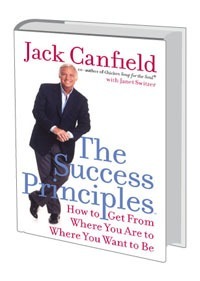Jack Canfield's Blog, page 5
May 31, 2011
Use Feedback to Your Advantage
 Once you begin to take action on a project or a goal, you'll start getting feedback about whether you're doing the right thing. You'll get data, advice, help, suggestions, direction - and even criticism - that will help you constantly adjust and move forward, while continually enhancing your knowledge, abilities, attitudes and relationships. But asking for feedback is really only the first part of the equation. Once you receive feedback you have to be willing to embrace it and respond to it.
Once you begin to take action on a project or a goal, you'll start getting feedback about whether you're doing the right thing. You'll get data, advice, help, suggestions, direction - and even criticism - that will help you constantly adjust and move forward, while continually enhancing your knowledge, abilities, attitudes and relationships. But asking for feedback is really only the first part of the equation. Once you receive feedback you have to be willing to embrace it and respond to it.
Two Types of Feedback
There are two kinds of feedback you might encounter, negative and positive. We tend to prefer the positive: results, money, praise, promotion, raise, awards, happiness, inner peace, etc. It feels better. It tells us we are on course and doing the right thing.
We tend not to like negative feedback: lack of results, little or no money, criticism, poor evaluations, complaints, unhappiness, inner conflict, pain, etc.
However, there is as much useful data in negative feedback as there is in positive feedback. It tells us that we are off course, headed in the wrong direction, and doing the wrong thing. This is priceless information!
How Most People Handle the Negative
Three of the most common – and unproductive – responses to negative criticism are:
• Caving in and quitting. How many times have you or someone you know hit an obstacle and given up the goal because it was too hard or "not meant to be"? This is a poor way to respond to criticism, because all it does it keep you stuck in the same place.
• Getting mad at the source of the feedback. How many times have you responded with anger, hostility or resentment when someone has given you negative feedback? This serves only to push away the messenger and the feedback, when the message you're receiving may be exactly what you need to hear to move closer to your goal.
• Ignoring the feedback. We all know people who tune out everyone's point of view but their own. The sad thing is that the feedback they are blocking could significantly change their lives, if only they would listen.
If you fall into any of these traps, try to remember that feedback is not criticism. It is simply information – corrective guidance that's meant to help to get you back on course to achieve your goal. I like to refer to negative feedback as information for "improvement opportunities."
Not every action will produce the desired result. Not every action will work. Making mistakes, getting it almost right, and experimenting to see what happens are all part of the process of eventually getting it right.
Thomas Edison is reported to have tried over 2,000 different experiments that failed before he finally got the light bulb to work. He once told a reporter that, from his perspective, he had never failed at all. Inventing the light bulb was just a 2,000-step process. If you can adopt that attitude, then you can be free to take an action, notice what result you get, and then adjust your next actions based on the feedback you have received.
The Most Valuable Question You May Ever Learn
In the 1980s, a multimillionaire businessman taught me a question that radically changed the quality of my life. So what is this magical question that can improve the quality of every relationship you are in, every product you produce, every service you deliver, every meeting you conduct, every class you teach and every transaction you enter?
Here it is:
"On a scale of 1 to 10, how would you rate the quality of our relationship during the last week?"
Here are a number of variations on this question that have served me well over the years...
"On a scale of 1 to 10, how would you rate:"
-our service?
-our product?
-my teaching?
-this class/seminar/workshop?
-this meeting?
-our date/vacation?
-this meal?
-my coaching/management?
-our performance?
-my parenting/babysitting?
-this book?
-this recording/show?
Any answer less than a 10 always gets this follow-up question:
"What would it take to make it a 10?"
This is where the really valuable information comes from. Knowing that a person is dissatisfied is not enough. Knowing in detail what will satisfy them gives you the information you need to do whatever it takes to create a winning product, service or relationship.
Ask Yourself for Feedback
In addition to asking others for feedback, ask yourself for feedback, too. Your body is very adept at telling you whether you are on course. When you are relaxed and happy, your body is telling you that you are on track. When you are constantly exhausted, tense, in pain, unhappy and angry, then you are off track.
Take time to listen to what your body is saying to you. Take time to listen to your physical sensations and your feelings. They are sending you important messages.
Remember, feedback is simply information. You don't have to take it personally; just welcome it and use it.
© 2011 Jack Canfield
 Resources:
Resources:
For more on Using Feedback to Your Advantage, review Principle #19 in The Success Principles Book.
If you donʻt already own a copy of the book, get one today in our Success Store.
Who's Coaching You On Your Path To Success?
 You would never expect an athlete to reach the Olympic Games without a world-class coach. Nor would you expect a professional football team to enter the stadium without a whole team of coaches; head coach, offensive coach, defensive coach, and a special teams coach. Yet, many people believe that they can achieve their goals and new levels of success without any outside support or assistance.
You would never expect an athlete to reach the Olympic Games without a world-class coach. Nor would you expect a professional football team to enter the stadium without a whole team of coaches; head coach, offensive coach, defensive coach, and a special teams coach. Yet, many people believe that they can achieve their goals and new levels of success without any outside support or assistance.If you fall into the category of people who believe that a coach is "good for some people, but not right for me," I urge you to challenge this belief. Because of all the things successful people do to accelerate their trip down the path to success, securing the services of a coach is at the top of the list.
A coach helps you clarify your vision and goals, supports you through your fears, keeps you focused, confronts your unconscious behaviors and old patterns, expects you to do your best, helps you live by your values, shows you how to earn more while working less, and keeps you focused on your core genius. The best part? Today, coaches are available to support you in achieving nearly every professional or personal goal, whether growing your business, losing weight or simply achieving the balance life you crave.
Worth More Than Money
Throughout my career, I have had many coaches who have helped me achieve my goals: business coaches, writing coaches, marketing coaches, and personal coaches. The results have been tremendous.
First and foremost, I immediately doubled my free time. I delegated more tasks, scheduled vacations rather than merely thought about them, and hired additional staff that ultimately positioned my business to earn more. And that was just in the first few months. Not only did my business benefit, but my family did as well.
For me, coaching wasn't just about making more money. It was about helping me make better decisions for myself and my business. The truth is, most coaching clients are very smart. Yet they still know the value of accessing someone who can be objective, honest, and constructive about the options they are facing.
Why Coaching Works
Regardless of whether the program is designed to achieve a specific business goal (say, increasing your real estate listings) or whether it's set up to help you simply gain more clarity and progress in all areas of your personal and professional life, a coach can help you with the following:
• Determine your values, vision, mission, purpose and goals
• Determine specific action steps to help you achieve those goals
• Help you sort through opportunities
• Keep you focused on your top priorities
• Achieve balance in your life while still accomplishing your business or career goals
Different Formats for Coaching
Coaching can be delivered privately or in groups. Most often, it's done through regularly scheduled telephone contact, although it can also be done in person. Over the course of the sessions, you'll work together with your coach to develop goals, strategies, and a plan of action that is positive, desirable, and realistic. Support is often provided between sessions through e-mail and other media.
Other coaches – typically those who are more established in a certain industry – help many clients at one time via group-coaching programs. This format allows you to tap into the energy of a group and learn from the experiences and challenges of other group members. These programs often feature structured large-group teleconferences in which you listen to valuable information, and then implement what you hear on your own. Some coaches will work with you every week and others once a month.
Still another form of group coaching are experiential seminars. These types of events go far beyond a simple lecture and PowerPoint presentation. Instead, they get you out of your seat to participate in hands-on transformational activities, such as small-group exercises, processing and sharing. You do the work you would normally do one-on-one with a coach, but instead you are among dozens or even hundreds of others engaged in the same activities.
My company offers all three types of coaching. Because I can make a bigger impact when working with many students at one time, I lead group coaching in the form of my Platinum Group, a small-group yearlong program, and a 7-day large-group program called Breakthrough to Success, where I lead participants through dozens of life-changing exercises and processes. But if you prefer one-on-one work, youcan opt to work with one of my highly trained coaches.
How to Find a Coach
There are literally thousands of coaches available to work with you. There are personal coaches, life coaches, and business coaches. Some are industry specific (dental, chiropractic, real estate, and speaking), some are job specific (executive coaches), and some are interest specific (strategic planning, health and wellness, finances, and career transition). You can find them on the Internet, in the phone book, and by asking around. There are organizations like Coach U and the International Coach Federation that can help you find a coach near you.
In my experience, the reason many of us are not living up to our fullest potential lies in the gap between knowing and doing. Often, we attempt to close that gap with the New Year's Resolution only to find ourselves back where we started come February or March. If you want to achieve more, find a coach to challenge you to do more and be more.
© 2011 Jack Canfield
Jack Canfield's Blog
- Jack Canfield's profile
- 1738 followers



